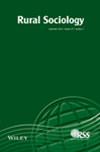Producing but Not Consuming? Food Provisioning in Remote, Rural Areas of the UK☆
IF 1.9
3区 社会学
Q2 SOCIOLOGY
引用次数: 0
Abstract
This is one of the first studies of food provisioning in remote rural areas of Scotland and England, providing evidence of precarity in food access at the same time as agricultural products are exported from the region to the global food system. We interviewed residents of four remote and rural areas of the UK about their food shopping habits and their purchase of local foods. Using theoretical resources from social science literature on food shopping, alternative food networks, and resilience to identify the influence of daily routine on rural food shopping practices, the importance of local retailers, the limited availability of locally produced foods, and the distinct nature of remote and rural households' food and shopping practices. Our findings illustrate the greater fragility of these rural food systems, the challenges faced by residents of these communities who can be unusually dependent on long and sometimes unreliable supermarket supply chains for the bulk of their food purchases, and the ‘buffering’ practices that they adopt to guard against possible food shortages. We argue that these practices can be considered as a form of care for both individuals and communities, but that, on their own, they cannot fully address this fragility. Initiatives to support shorter supply chains could improve the resilience of rural food systems but would require investment in infrastructure such as abattoirs, market spaces, and polytunnels in order to increase production, meet existing demand for locally produced food, and keep that food within these areas for local consumers.生产但不消费?英国偏远农村地区的食物供应
这是对苏格兰和英格兰偏远农村地区粮食供应的首批研究之一,在农产品从该地区出口到全球粮食系统的同时,提供了粮食获取不稳定的证据。我们采访了英国四个偏远和农村地区的居民,了解他们的食品购物习惯和购买当地食品的情况。利用社会科学文献中关于食品购物、替代食品网络和弹性的理论资源,确定日常生活对农村食品购物行为的影响、当地零售商的重要性、当地生产食品的有限供应,以及偏远和农村家庭食品和购物行为的独特性质。我们的研究结果说明了这些农村粮食系统的脆弱性,这些社区的居民所面临的挑战,他们可能异常依赖于漫长的、有时不可靠的超市供应链来购买大部分食品,以及他们为防止可能的粮食短缺而采取的“缓冲”做法。我们认为,这些做法可以被视为对个人和社区的一种护理形式,但它们本身并不能完全解决这种脆弱性。支持缩短供应链的举措可以提高农村粮食系统的复原力,但需要对屠宰场、市场空间和综合隧道等基础设施进行投资,以增加产量,满足对当地生产食品的现有需求,并将这些食品留在这些地区,供当地消费者使用。
本文章由计算机程序翻译,如有差异,请以英文原文为准。
求助全文
约1分钟内获得全文
求助全文
来源期刊

RURAL SOCIOLOGY
SOCIOLOGY-
CiteScore
4.60
自引率
13.00%
发文量
47
期刊介绍:
A forum for cutting-edge research, Rural Sociology explores sociological and interdisciplinary approaches to emerging social issues and new approaches to recurring social issues affecting rural people and places. The journal is particularly interested in advancing sociological theory and welcomes the use of a wide range of social science methodologies. Manuscripts that use a sociological perspective to address the effects of local and global systems on rural people and places, rural community revitalization, rural demographic changes, rural poverty, natural resource allocations, the environment, food and agricultural systems, and related topics from all regions of the world are welcome. Rural Sociology also accepts papers that significantly advance the measurement of key sociological concepts or provide well-documented critical analysis of one or more theories as these measures and analyses are related to rural sociology.
 求助内容:
求助内容: 应助结果提醒方式:
应助结果提醒方式:


